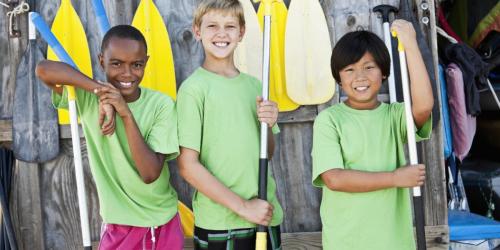Camp can be a wonderful experience for children opening their worlds to new skills and opportunities. Today summer camp takes many forms, including day camps focusing on one particular activity or skill, such as soccer or computer camps. The “old school” summer camp still thrives, however, frequently located on a lake or a river, or in the mountains or a forest, and offering a range of learning and recreational activities, including swimming, rowing, canoeing, horseback riding and archery.
While every parent wants their child to have a safe experience at summer camp, injuries can occur. These include:
- Tragic drowning or near drowning accidents that may be due to inadequate supervision by camp counselors with little experience, who leave their posts, or are distracted by their cell phones or others;
- Other incidents of wrongful death, caused by a fall or exposure to a fire hazard;
- Sexual abuse of your child by camp counselors or other camp staff;
- Physical injuries, caused by faulty, poorly maintained or hazardous camp lodgings and facilities;
- Burn injuries, perhaps caused by improper supervision around campfires;
- Injuries from bullying by other children, or otherwise being subjected to violence, including emotional trauma; and
- Infectious diseases spreading throughout the camp population.
Be Proactive About Camp Safety
If you plan to send your child off to summer camp, you should take steps to help safeguard against these injuries by:
- Making sure you have adequate insurance coverage, which may involve buying extended coverage beyond your basic insurance and health plan. You can also purchase accident insurance but be aware that accident insurance policies frequently do not pay out. For a recent case on point see here;
- Visiting the camp to confirm their equipment and facilities are maintained properly and that they have first aid and medical emergency procedures in place;
- Equipping your child properly for camp, including outfitting them with appropriate footwear and clothing, a reusable water bottle, sunscreen, and any medications your child may need;
- Making sure your child knows how to swim, boat, ride a bike or ride a horse if these are going to be the activities at the summer camp, so they are not more vulnerable as “beginners.” If your child is a beginner, take steps to make sure the camp staff is aware of this fact and that there are appropriate beginner level activities in place;
- Going over your child’s particular food requirements and any allergies with the camp staff before you leave your child at the camp the first day, and reviewing any special instructions on their medication requirements; and
- Alerting the camp staff if your child has disabilities or special needs that they should be aware of.
What to do if Your Child is Injured
In the event your child is injured – what should you do? Here is a list of steps you can take:
- Make sure that your child receives emergency medical care, and go to your child as soon as possible.
- Take care to record the name of the hospital or medical clinic that your child goes to, and the names of any doctors, nurses or other medical staff who treat your child.
- Try to find out how the injury happened. Talk to all camp staff that were there at the time of the incident, and make notes as to what they tell you. Date and sign these notes, and be sure to keep them in a safe place.
- Contact the parents of other children present at the time of the incident to get their permission to talk to their children about what happened. It is unlikely that the camp will simply let you interview other children without parental consent and collecting this information may have to wait until that happens. If you have obtained parental permission, take notes, date and sign them, and keep them in a safe place.
- Consider who else may also have been a witness to the incident and record their names and contact information, try to talk to them, and take detailed notes.
- Take photographs of the scene of the incident and of the extent of the injuries your child has suffered.
- Ask to speak to the head of the camp staff, and ask whether they have prepared an “incident” or “accident” report, and obtain a copy.
- Find out if there has been a police report filed, and obtain a copy.
- After your child has received medical help, get copies of all medical records.
- Keep copies of all bills that you pay as a result of your child’s injury, including any special medical aids, such as crutches, and bills for medications, etc.
- Contact a personal injury lawyer to review the situation and discuss your options.
Compensation for Injuries at Camp
There are various reasons why you may be able to successfully sue the camp and other authorities for compensation for the injuries suffered by your child, or for the wrongful death of your child. The camp premises may have been hazardous with, for example, unsafe stairs, hazardous walkways, and dangerous piers. The supervision of your child may have been inadequate, or totally lacking. The camp equipment may have been hazardous, with, for example, inadequate life jackets, leaky or unstable boats, or ornery horses. The staff may have been inherently dangerous due to a lack of criminal background checks conducted by the camp authorities. Camp activities may have been high risk and unduly hazardous – an activity must be suitable for the child’s age and ability, have adequate equipment, with suitable instruction, and be properly supervised.
An example of a nightmare scenario is when your child is sexually abused at camp. This happened in this Ontario case where three young boys were sexually assaulted by a priest at a summer camp. The priest took them out on unsupervised overnight camping trips and had them visit in his private room during the day. The sexual assaults had devastating effects on the boys, and they grew up to have difficulties with the law, alcohol and drug abuse issues, and difficulty holding down employment. They were successful in suing for compensation for their injuries and not only was the camp held liable, but the diocese of the priest was also held to be vicariously liable.
Not Every Injury is Compensable
Not all injuries suffered by a child at summer camp will be compensable, of course. This was the case recently in British Columbia where the school board who offered the day camp was found not to be liable because the activity in which the child suffered injury, a game of “grounders”, was found to be within a reasonably safe range of playground activity for someone of the child’s age and experience.
Whether or not the parents have signed a waiver is another consideration regarding the potential liability of the summer camp authorities. However, even in the presence of a waiver signed by a parent, there is an argument that parents cannot waive the rights of their minor children to sue, as was the situation in this BC Case.
As we have recently discussed in another CAM LLP blog post, waivers are not always binding, and in many situations a successful lawsuit can be launched notwithstanding a waiver.
Another consideration is the time period within which the camp authorities must be sued for the injuries suffered by the child, and we discussed limitation periods in this CAM LLP blog post.
The bottom line is, that if your child has been seriously injured at summer camp or if the worst should happen and there has been a wrongful death, you should get legal advice as soon as possible. If you find yourself in this situation and you need help, CONTACT US for a free consultation with one of our experienced personal injury lawyers.

